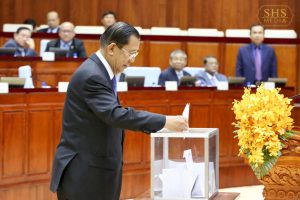On Sunday, Cambodia will vote to elect a new Senate – and among those putting themselves forward for a seat is none other than former Prime Minister Hun Sen, who handed the reins of power to his son last year after nearly four decades in office.
Hun Sen has previously announced that he will stand for a Senate seat in Kandal province, where he has held a National Assembly seat since 1993. The expectation is that he will then be appointed as president of the body, replacing the incumbent Say Chhum, who is set to retire.
Cambodia’s Senate elections are tightly circumscribed, even by local standards. Two of the 62 senators are appointed by the King and two are appointed by the National Assembly. The remaining 58 are selected by the 125 members of the National Assembly and members of the country’s 1,652 commune councils – an electorate totaling just 11,747 people. As such, they simply reflect the partisan make-up of these bodies, which are unsurprisingly dominated by the ruling Cambodian People’s Party (CPP).
At last year’s no-contest national election, the CPP won 120 of the 125 seats in the National Assembly. At the commune council elections in 2022, it won 74.3 percent of the vote, which translated into 1,648 of the country’s 1,652 commune chief positions and 9,376 of the 11,622 available commune council seats. While the Candlelight Party, which won 2,198 commune council positions, might manage to elect one or two of its candidates to the Senate, it is safe to treat the result of Sunday’s election, and Hun Sen’s subsequent appointment as the president of the Senate, as a foregone conclusion.
The position of the Senate president is overwhelmingly ceremonial. The body was created not out of any pressing legislative need, but as part of the power-sharing negotiations that followed the 1998 election. After Chea Sim, the late president of the CPP, was forced to relinquish his position as National Assembly president to make way for a leader from the royalist party Funcinpec, the Senate was created to give him a new personal power base. While the Senate has the power to review and request changes to laws passed by the National Assembly, it has virtually never performed this function, merely waving through legislation from the lower chamber.
For this reason, the Senate presidency will simply add to the long roster of honorary positions that the 71-year-old Hun Sen will hold as he enters the twilight of his career. These include the presidency of the CPP and the presidency of the Supreme Privy Council to the King, a position “with equal rank” to the prime minister.
However, the Senate president does have one meaningful power, which is to serve as acting head of state when the King is out of the country. While it is unlikely that any potential rival could make use of this to undermine the power of Prime Minister Hun Manet, who took office in August, Hun Sen’s occupation of the Senate presidency will act as a safeguard. While last year’s handover of power to Manet went smoothly, there is always the possibility that a challenge might emerge from within the current power structure. By occupying this position, Hun Sen can cover his son’s flank and forestall any attempt to undermine his control of the legislature.
Hun Sen’s ascent to the post is the latest step in the wider generational succession within the CPP, which peaked with Hun Sen’s transfer of the prime ministership to Manet after last year’s national election. Earlier this week, Hun Sen’s youngest son Hun Many was appointed as a deputy prime minister. Members of the family are now ensconced in key positions across the administration, to ensure that the Hun family’s control of Cambodia persists until the end of Hun Sen’s life – and far beyond.

































